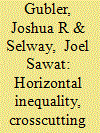| Srl | Item |
| 1 |
ID:
152228


|
|
|
|
|
| Summary/Abstract |
Does the enumeration of ethnic, racial, and/or religious categories on national household censuses increase the likelihood of conflict? The authors propose a theory of intergroup relations that emphasizes the conflictual effects of institutionalizing boundaries between social identity groups. The article investigates the relationship between counting and various forms of conflict with an original, global data set that classifies the type of enumeration used in more than one thousand census questionnaires in more than 150 countries spanning more than two centuries. Through a series of cross-national statistical analyses, the authors find a robust association between enumeration of ethnic cleavages on the census and various forms of competition and conflict, including violent ethnic civil war. The plausibility of the theory is further demonstrated through case study analysis of religious conflict in India.
|
|
|
|
|
|
|
|
|
|
|
|
|
|
|
|
| 2 |
ID:
174021


|
|
|
|
|
| Summary/Abstract |
This study examines threat perception amongst internal migrant groups in Turkey by proposing the ‘hometown cluster-based intergroup threat model.’ It contributes to the existing literature in two important respects. First, this study generates hometown clusters by measuring the social distance between migrants. Second, four dimensions of threat perception – culture, language, religion, and economics – are analyzed to reveal the development of conflict amongst internal migrant groups. The results reveal that in Gebze, a city inhabited mostly by migrants, threat perceptions are activated by both hometown clusters and ethno-religious identities.
|
|
|
|
|
|
|
|
|
|
|
|
|
|
|
|
| 3 |
ID:
113821


|
|
|
|
|
| Publication |
2012.
|
| Summary/Abstract |
In this article, the authors bring together research on horizontal inequality, geographic dispersion of ethnic groups and crosscutting cleavages to present a more holistic theory of ethnic structure and civil war onset. The authors argue that rebel leaders are thwarted in their mobilization efforts in highly crosscutting societies due to a lower probability of potential combatants identifying with nationalist goals, decreased ability to exert social control, and diminished in-group communication. Using cross-national data from over 100 countries, the authors provide evidence that civil war onset is an average of nearly twelve times less probable in societies where ethnicity is crosscut by socioeconomic class, geographic region, and religion.
|
|
|
|
|
|
|
|
|
|
|
|
|
|
|
|